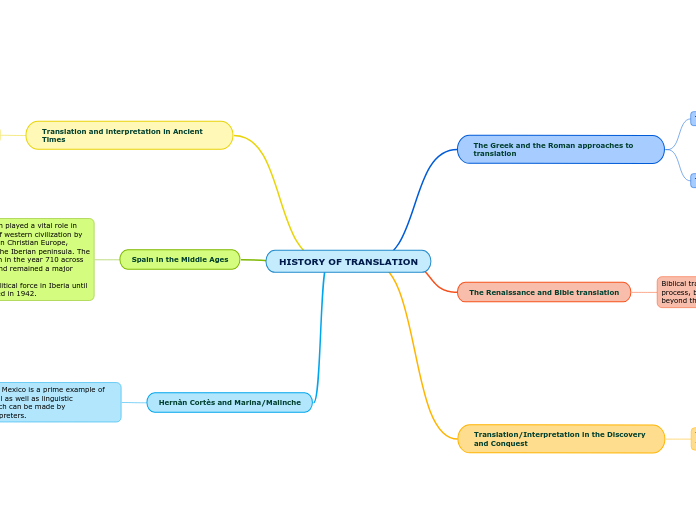HISTORY OF TRANSLATION
Hernàn Cortès and Marina/Malinche
The Conquest of Mexico is a prime example of the psychological as well as linguistic contribution which can be made by translators/interpreters.
Cortès discovered that his main interpreter Jerònimo de Aguilar was initially of very limited use to him since he spoke only Maya, and the dominant language as they entered the Aztec empire was Nahuatl.
The chief of the Tabasco tribe gave him an Indian maiden in tribute. The woman`s name was originally “Malintzin” in Nahuatl. Malinche thus spoke Nahuatl as well as the Maya language of the lowland tribes. By pairing up Jerònimo de Aguilar and Marina, Cortès now had a team of interpreters through which he could speak to the Aztecs and the tribes dominated by the Aztecs who had been forced to learn Nahuatl.
Spain in the Middle Ages
In the Middle Ages Spain played a vital role in preserving the culture of western civilization by serving as a link between Christian Europe, Islam, and the Jews of the Iberian peninsula. The Arabs had invaded Spain in the year 710 across the Strait of Gibraltar, and remained a major
cultural, military and political force in Iberia until they were finally expelled in 1942.
The Jewish community in Spain played a key role in translation in these years. With their knowledge of Arabic, Latin, and the emerging Iberian romance languages, they were the principal scholar who formed the bridge between the Islamic books in the libraries and the hunger for the knowledge those books contained.
Translation and interpretation in Ancient Times
The Biblical explanation
The Tower of Babel, as told in Genesis 11. After the great Deluge the descendants of Noah wandered onto the plain of Shinarin in Babylonia (Mesopotamia), and there in their arrogance decided to build a tower high enough to reach Heaven. An angry Jehovah punished their temerity by taking away their common language and giving them different ones, thus confusing and frustrating them since they could no longer understand each other.
Translation/Interpretation in the Discovery and Conquest
The impact of the translators and interpreters in the Renaissance was not limited to literature.
The contacts with a bewildering range of new civilizations and languages in the New World, Africa and the Far East placed a severe demand on the translators and interpreters available to the merchants, missionaries and explorers who carried the dynamism of the Renaissance to distant shores.
The Renaissance and Bible translation
Biblical translation was at the heart of this process, but the scope of translations went far beyond the Bible.
A typical Renaissance statement of translation principles is that laid out by French humanist and translator Etienne Dolet, who was tried for heresy, tortured and strangled (his body and books later being burned) because he supposedly mistranslated one of the dialogues of Plato in such a manner as to undermine belief in man’s immortality.
Dolet’s five basic principles:1.- The translator must understand perfectly the content and intention of the author he is translating.
2.- The translator should have a perfect knowledge of the language from which he is translating (I. e., “source language”) and an equally excellent knowledge of the language into which he is translating (I. e., “target language”).
3.- The translator should avoid the tendency to translate word for word, for to do so is to destroy the meaning of the original and to ruin the beauty of the expression.
4.- The translator should employ forms of speech in common usage.
5.- Through his choice and order of words the translator should produce a total overall effect with appropriate “tone.”
The Greek and the Roman approaches to translation
The Romans
The great Roman enthusiasm for translation, especially from the Greek, was the result of the pragmatic Roman attitude toward the other Mediterranean cultures: if it enriched Roman culture, then it would be adopted and adapted. To do this, translation was frequently necessary.
The Greeks
They minimized the value of anything not written in Greek. Thus, although they undoubtedly learned other Mediterranean languages and interpreted into them in order to conduct trade, they did not translate much from those languages into Greek.









